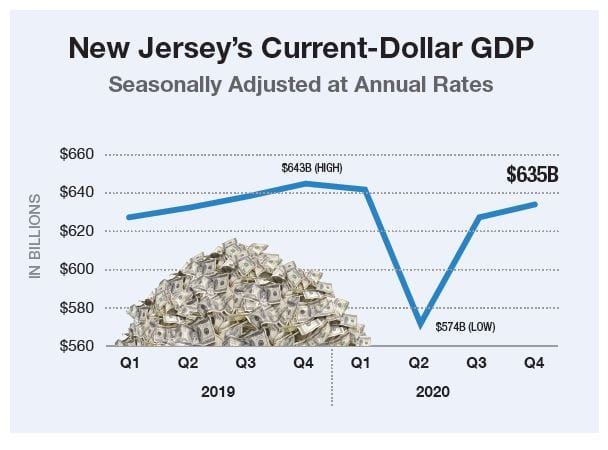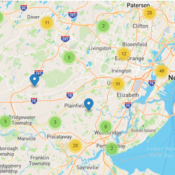NJ 2020 GDP Begins Rebound after Steep Drop
Key statistics that track New Jersey’s economic activity, known as economic indicators, help judge an economy’s overall health. Economic growth (or lack thereof) is measured in various ways, but one of the most telling statistics is Gross Domestic Product (GDP).
 GDP by Quarter: Prior to the onset of the pandemic, in Q1 2020, New Jersey’s GDP totaled $641.7 billion, a 3.3% decline from the preceding quarter, according to the US Bureau of Economic Analysis (US BEA). At the time, no one had the foresight to know just how bad things were about to get.
GDP by Quarter: Prior to the onset of the pandemic, in Q1 2020, New Jersey’s GDP totaled $641.7 billion, a 3.3% decline from the preceding quarter, according to the US Bureau of Economic Analysis (US BEA). At the time, no one had the foresight to know just how bad things were about to get.
In Q2 2020, New Jersey’s GDP contracted 35.6% due to government-mandated closures of non-essential businesses and stay-at- home orders implemented after COVID-19 hit New Jersey. Luckily, in Q3 2020, New Jersey’s GDP grew 37.2% relative to the preceding quarter and totaled $626.7 billion.
New Jersey experienced more growth in Q4 2020, with a 4.8% increase in GDP. The Garden State’s GDP totaled $634.9 billion in Q4 2020, $6.8 billion below the value of New Jersey’s Q1 2020 GDP. Overall, New Jersey’s annual real GDP declined 4.1% in 2020 compared to 2019.
Largest Industries as % of GDP: In 2020, New Jersey’s largest industry as a percentage of total GDP was finance, insurance, real
estate, and leasing. According to the US BEA, this industry accounted for 22% of New Jersey’s GDP and experienced a 1.6% real
decline compared to 2019. The professional & business services industry (16.9%) was the second largest, followed by government &
government enterprises (10.6%), education services, healthcare and social assistance (9.3%), and manufacturing (8.6%). All other
industries in the state accounted for 32.6% of New Jersey’s GDP in 2020, according to a Focus NJ analysis of US BEA data.
Stock Market: Typically, the stock market and economic performance are aligned, but the US stock market finished 2020 at all-time highs despite record contraction in March. According to The Washington Post, the S&P 500 Index finished the year up 16%, while the Dow Jones Industrial Average and Nasdaq composite grew 7.3% and 43.6%, respectively. Record-breaking stock market growth was fueled by the largest federal stimulus in history, strong support from the Federal Reserve, and optimism about the mass distribution of vaccines in the future.
Small Business: Despite the stock market gains, investors have largely ignored the pain on Main Street. Small businesses in New Jersey finished the year with 31.2% decline in the number of open small businesses compared to January 2020, according to Opportunity Insights Economic Tracker. In addition, small businesses in New Jersey experienced a 35.8% decline in revenue during the same time span.
This content was published in the May 2021 Edition of the NJ Business Magazine.





